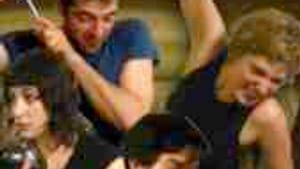Stay in the Loop
BSR publishes on a weekly schedule, with an email newsletter every Wednesday and Thursday morning. There’s no paywall, and subscribing is always free.
Choose your ideological baggage (before it chooses you)
"Portmanteau' at the Fringe Festival

How does a theater company produce a play without a playwright? The two co-creators of Applied Mechanics' fascinating, intelligent Fringe production Portmanteau select a theme and a setting, then build a plot around a collage of dialogue lifted from other writers, including Tennessee Williams, Upton Sinclair, filmmakers Luc Besson, Gus Van Sant, and Paul Thomas Anderson, and The Bible.
Director Rebecca Wright and designer Maria Shaplin plop Portmanteau down in the town square of an unnamed Eastern European country. Here Eli Worthing, a backgammon-playing Bostonian businessman (Thomas Choinacky) hopes to improve the local living standard (and turn a profit as well) by opening a silver and copper mine. A zealous environmentalist named Maud (Kristen Bailey) follows on his heels to stir up the townsfolk into thwarting his plans.
The two antagonists peddle their ideological wares to whomever will listen (including the audience), and their debates soon escalate into a conflict that transforms the village's open marketplace into a battleground of capitalism vs. environmentalism. The fight quickly enlists the other characters: an ingénue British secretary on holiday (Jess Hurley) and an unemployed young Czech (John Jarboe) who owes allegiance to no one but his hunger. All the while, a young documentarian named Verna Herzog (Mary Tuomanen) pokes her camera in their faces and ours, using objectivity as a thin veneer to cover her artistic motivations.
By themselves, the careful selection of dialogue and the fine acting create a compelling, innovative piece of theater. But Wright and Shaplin build another layer of innovation into Portmanteau with their "choose your own adventure" approach to the staging. They've used this tactic in Applied Mechanics productions before— forcing patrons to wander through the rooms of a bar on the coattails of circus performers in last year's It's Hard Times at the Camera Blanca, and asking us to follow intrepid travelers through a labyrinthine West Philadelphia apartment in Ses Voyages Sauvages.
During Portmanteau's first 20 minutes, the open layout at the Lantern Theatre hindered the enjoyment; Maud and Eli argue loudly as they compete for "buyers," and the endlessly fascinating Mary Tuomanen flits about the landscape with a verve that's impossible to ignore or resist. Unlike the case in Applied Mechanics' other works, I couldn't focus on one character's story without being distracted by the bickering or preaching of others.
But slowly, the marketplace setting and the brilliance of Wright and Shaplin's idea worked their force. The two antagonists pulled apart into the corners and began to demarcate the space. By asking us to choose one character to follow over another, Portmanteau— even if only subconsciously— asks us to take sides and reveal which viewpoint fits best inside the particular ideological baggage each of us carries.♦
To read a response, click here.
Director Rebecca Wright and designer Maria Shaplin plop Portmanteau down in the town square of an unnamed Eastern European country. Here Eli Worthing, a backgammon-playing Bostonian businessman (Thomas Choinacky) hopes to improve the local living standard (and turn a profit as well) by opening a silver and copper mine. A zealous environmentalist named Maud (Kristen Bailey) follows on his heels to stir up the townsfolk into thwarting his plans.
The two antagonists peddle their ideological wares to whomever will listen (including the audience), and their debates soon escalate into a conflict that transforms the village's open marketplace into a battleground of capitalism vs. environmentalism. The fight quickly enlists the other characters: an ingénue British secretary on holiday (Jess Hurley) and an unemployed young Czech (John Jarboe) who owes allegiance to no one but his hunger. All the while, a young documentarian named Verna Herzog (Mary Tuomanen) pokes her camera in their faces and ours, using objectivity as a thin veneer to cover her artistic motivations.
By themselves, the careful selection of dialogue and the fine acting create a compelling, innovative piece of theater. But Wright and Shaplin build another layer of innovation into Portmanteau with their "choose your own adventure" approach to the staging. They've used this tactic in Applied Mechanics productions before— forcing patrons to wander through the rooms of a bar on the coattails of circus performers in last year's It's Hard Times at the Camera Blanca, and asking us to follow intrepid travelers through a labyrinthine West Philadelphia apartment in Ses Voyages Sauvages.
During Portmanteau's first 20 minutes, the open layout at the Lantern Theatre hindered the enjoyment; Maud and Eli argue loudly as they compete for "buyers," and the endlessly fascinating Mary Tuomanen flits about the landscape with a verve that's impossible to ignore or resist. Unlike the case in Applied Mechanics' other works, I couldn't focus on one character's story without being distracted by the bickering or preaching of others.
But slowly, the marketplace setting and the brilliance of Wright and Shaplin's idea worked their force. The two antagonists pulled apart into the corners and began to demarcate the space. By asking us to choose one character to follow over another, Portmanteau— even if only subconsciously— asks us to take sides and reveal which viewpoint fits best inside the particular ideological baggage each of us carries.♦
To read a response, click here.
What, When, Where
Portmanteau. By Rebecca Wright, Maria Shaplin and the ensemble; directed by Rebecca Wright. Applied Mechanics production through September 11, 2010 in various locations as part of the Philadelphia Fringe Festival. www.livearts-fringe.org/details.cfm?id=14340.
Sign up for our newsletter
All of the week's new articles, all in one place. Sign up for the free weekly BSR newsletters, and don't miss a conversation.

 Jim Rutter
Jim Rutter